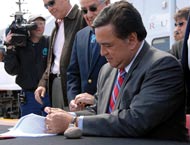1/23/2008
New Mexico Governor to Grab Photo Ticket RevenueNew Mexico governor gives state legislators the green light to pass legislation taking profit away from the Albuquerque photo enforcement program.

New Mexico Governor Bill Richardson (D) announced Monday his intention to promote legislation that would take photo enforcement profit out of the hands of cities and place it into state coffers. Last April, Richardson had vetoed a measure that would have given cities only $35 in profit from each ticket worth no more than $100 (bill text). Currently, Albuquerque issues red light camera and speed camera tickets that can cost up to $400 each.
"After discussing the issue and at the request of several legislators, Governor Richardson has agreed to put the red-light camera issue on the agenda for the ongoing session," the New Mexico governor's blog stated. "The governor believes it is reasonable for the legislature to revisit the issue."
Richardson, who recently dropped out of the presidential race, is taking aim at Albuquerque Mayor Marty Chavez (D) who recently quit his run for the US Senate. Chavez had promised Richardson that he would drop the cost of fines in return for the veto, but Chavez has failed to hold up his end of the bargain. By doing so, Chavez has enjoyed $11.7 million in revenue since 2005 with more than $5.1 million in net profit to spend on new government programs.
Chavez briefly toyed with the idea of killing his automated ticketing program after it proved unpopular and became a drag on his aspirations to higher office. The city council, however, recently discovered that it has no ability to cancel the contract because of backroom agreements Chavez made with Australian vendor Redflex in 2005. The changes erased a cancellation clause that had been part of a draft contact approved by the city council. Some council members expressed concern that after more than two years of ticketing, even the city's "blue ribbon panel" comprised of government officials and the insurance industry failed to generate evidence that the program has provided a public safety benefit.
"When the STOP program was implemented, a protocol was not in place to evaluate its effectiveness in preventing crashes and deterring violations at automated intersections," the January 15 task force report stated.
The report also noted that the Australian vendor has withheld information regarding the public safety program it operates.
"Data about violations at the automated enforced intersections are much more complete," the report stated. "Yet, Redflex provides only the most basic data to the city -- by approach by date by type of violation (red light running and speeding). No trend analysis is provided, nor are operational explanations given for variations in the data. Combined with APD's lack of traffic analysis resources, the city is limited in its ability to assess the STOP program."
The council is also powerless to change the per-ticket method of compensation that gives Redflex up to $45 for each ticket it is able to issue.
"This creates the perception that the STOP program is privatized law enforcement and a governmental revenue generating program, instead of a public safety program," the task force report stated.


